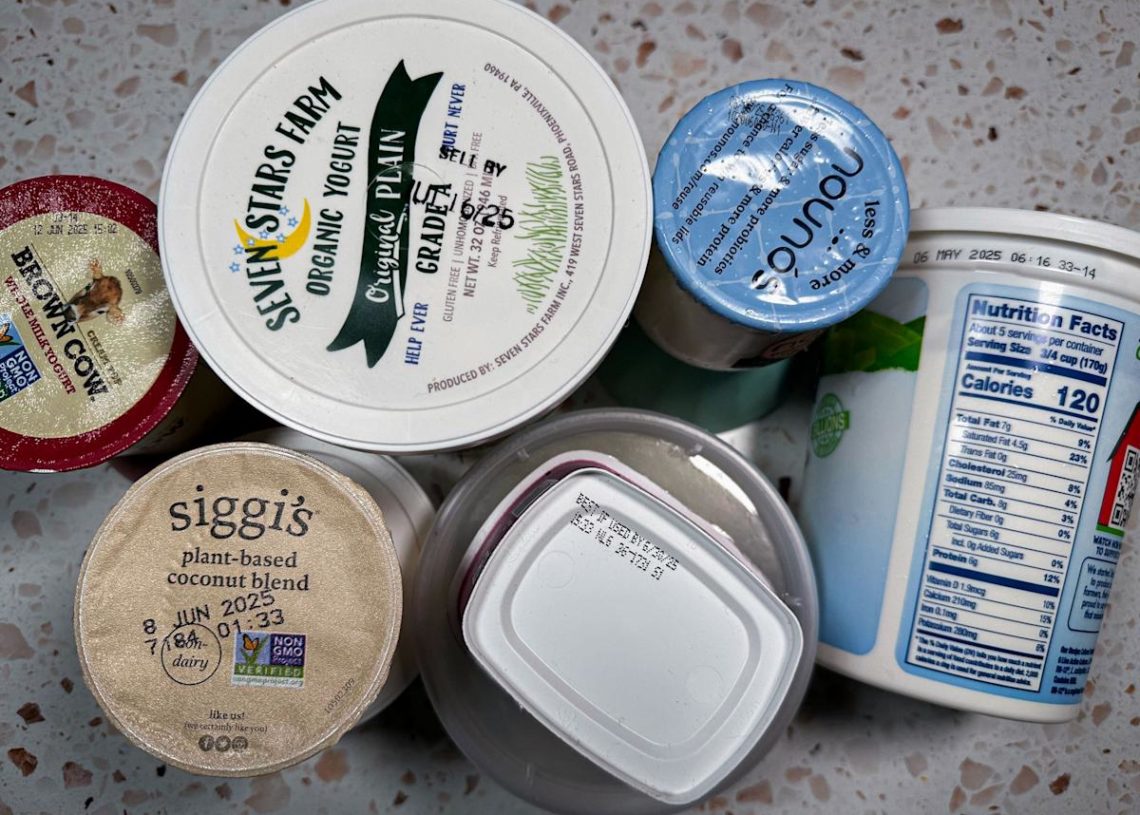Date labels. Expiration dates. Best-by dates. Whatever you call them, at some point, you’ve probably squinted at those tiny dot-matrix-printed numbers and wondered: “Does this mean my cheese might kill me?”
If so, you’re not alone. Date labels are often unclear, inconsistent and, I think it’s fair to say, downright bewildering. ReFED, a nonprofit dedicated to food waste reduction, estimates that confusion over those dates and phrases leads U.S. consumers to throw away about 3 billion pounds of food annually, which equates to $7 billion in losses. ReFED maintains that nationally regulating date labels and educating consumers could take a significant bite out of the estimated one-third of food that goes to waste – with serious financial and environmental consequences – in the United States every year.
For now, there’s a lot to demystify. As you navigate the wilds of your fridge, cabinets and pantry, and, perhaps as you and your partner or roommates trade heated words over less-than-fresh orange juice that c’mon, guys, really seems fine, consider these myths about the little prophecies stamped on our food.
– – –
Myth: All food should be thrown away as soon as the printed date passes
“Many people interpret food dates to be about the safety of food,” said ReFED President Dana Gunders. “But for the vast majority of foods, those dates are really just about quality.”
So what happens after the printed date? If you wait long enough, most perishable goods will obviously spoil, while most shelf-stable goods will physically degrade, which could take a very long time. So, flavors and colors might fade. Old almonds, for example, won’t be overrun with bacteria but will taste off as their oils break down. Acidic dairy products such as yogurt and sour cream are inhospitable to dangerous bacteria but may become more tart over time (you might also find obvious spoilage, like mold, after an open yogurt container has spent awhile in the fridge). Properly refrigerated pasteurized milk can be fine past its date, but will eventually develop off odors and flavors.
So, in most cases, you can inspect, sniff and, where reasonable, taste food past its preordained shelf life to determine if it’s still good enough for you. But …
– – –
Myth: You can always rely on your senses when assessing food past its date
Some moist foods served straight from the fridge can host dangerous bacteria that can, over time, grow to infectious levels, even under refrigeration, even as the food still looks and smells fine. These foods are particularly risky during pregnancy, so Gunders suggests deference to dates on foods, such as deli meats, that pregnant people are told to avoid.
Kathy Glass, who recently retired as associate director at the Food Research Institute at the University of Wisconsin at Madison, said she respects “use-by” dates and other storage guidance (like an ideal fridge temperature) on refrigerated products, particularly those designed to be eaten cold. “Many manufacturers have researched spoilage versus safety to determine those dates,” she said. On those keep-cold products, she said the phrase “use by” signals “they’ve done their studies to demonstrate that if you would use it by that particular date, and you kept it at a good refrigeration temperature, it should be safe.” Food should be refrigerated between 35 and 40 degrees, she said.
“It’s not as if it’s going to explode in your refrigerator on the ‘use-by’ date,” said Glass, whose work included testing pathogens’ abilities to grow in various food products in conditions simulating consumer kitchens. But, she said, caution is warranted, especially for people with less robust immune systems. You can also pause the clock by freezing the food, or, if you’re on the edge, minimize the risk by cooking, say, slices of turkey breast, to 165 degrees. Breakfast sandwich, anyone?
Of course, you might also see “use by” on products that don’t require any special precautions. That brings us to our next myth …
– – –
Myth: Date labels are nationally standardized
“Use by,” “best by,” “expires on” or any of the other myriad phrases you might see stamped on your food don’t have official definitions. The federal government requires a “use-by” date only on infant formula (the date is the last point at which the manufacturer guarantees the nutritional content; nutrients eventually degrade).
Absent broad federal regulation, a patchwork of state and local laws, some contradicting each other and sending good food to the trash, govern date labels on various foods. In Montana, for example, milk must bear a “sell-by” date of 12 days post pasteurization, even though milk usually lasts longer. After that, stores can’t legally sell it.
Advocates want to eliminate consumer-facing “sell by” dates and restrict manufacturers to “best if used by” for quality and “use by” for safety. Bills to codify this have floated around Congress for years, and a coalition of food companies created a voluntary standard in 2017. But plenty of manufacturers still use other phrases. Sometimes they have no choice.
Because of the existing state laws, companies “couldn’t fully follow that voluntary standard without running afoul of state law,” said Emily Broad Leib, director of the Food Law and Policy Clinic at Harvard Law School.
Still, next year, a new California law simplifying consumer-facing date labels to the “best if used by”/“use-by” binary goes into effect, and the Food and Drug Administration and Department of Agriculture recently concluded a public comment period on food dating. Broad Leib’s legal clinic, ReFED and others believe the federal agencies could use their regulatory authority to streamline date labels.
“People are wasting money every day by throwing food away that they could be eating,” Broad Leib said. People should “have the freedom to say, ‘The date passed, but this still looks and smells fine.’ … And for the small number of foods where there is actually a safety risk, not having these standards is also making people potentially take extra risk.”
– – –
Myth: Most date labels are meaningless
Companies determine shelf life in a number of ways, from rigorous original research to reliance on past product data or food science concepts, or even consumer complaints and educated guesses. Depending on how the company arrives at the date, it could be very conservative, with a lot of decent quality shelf life remaining, or you could notice the product declining quickly after the date. Interpret dates on shelf-stable foods as the last point at which the manufacturer guarantees quality.
At Nature’s Path Organic Foods, Linsey Herman, associate vice president of research and development, said accurate date labels are a priority for keeping customers happy. The breakfast and snack food company’s employees conduct weekly blind taste tests on products stored in various conditions for various time periods. When enough people detect a notable quality slip, shelf life is established. While many factors affect how a food ages, Herman said ground seeds and nuts, whose healthier fats break down relatively quickly, often shrink shelf lives. Rancid fats can smell like paint or cardboard or have an otherwise unappetizing odor. A Nature’s Path cereal with ground flaxseed, for example, has about half the shelf life of a grain-based flake cereal.
Once a “best by” date passes, Herman urges consumers to use their judgment. “Maybe you stored it in a cool, dark place so it’s in great shape and it might have a long shelf life,” she said, noting that storage near heat sources like the stove can accelerate aging. But, she said, if you get a chemically whiff from those broken-down oils, “I would not recommend eating it.”
I know that off-putting smell from my own cabinet-aged granola bars. On the other hand, I recently had no qualms pouring corn kernels more than a year past their “best by” date into my popcorn popper. My snack turned out great.
Some dates may be more meaningful than others, but I’d argue it’s worth paying attention to them to help nudge yourself toward eating what you have. Ultimately, eating the food already in your kitchen and buying less at the store will help you reduce food waste, save money and eat fresher food.
– – –
Myth: Food banks cannot accept ‘expired’ food
Many nonprofits accept food donations after the “best by” date. In Utah, for example, Bountiful Food Pantry invites donations of food up to three years past the printed date. The pantry’s website explains: “Our army of volunteers goes through all food items and makes sure they’re still safe and healthy to eat, and we don’t distribute any food we wouldn’t eat ourselves.”
Of course, check with a nonprofit before you arrive with “expired” goods – some may not accept them and some might be hamstrung by local laws. Broad Leib said about 20 states restrict the sale or donation of past-dated food. When laws are silent, she said, that also creates a barrier, “because there’s no one saying this is allowed.”
– – –
Rachael Jackson is a D.C.-based writer and the founder of eatortoss.com. Reach her at [email protected].
Related Content
Despite ceasefire, India and Pakistan are locked in a cultural cold war
The D.C. plane crash took her mom and sister. She turned to her piano.
Johnson again corrals GOP factions to pass Trump’s sweeping tax bill
The post 5 myths about food expiration dates and best-by labels appeared first on Washington Post.



